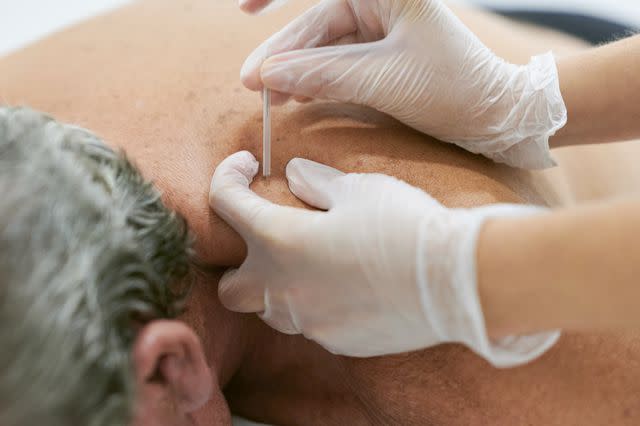Can You Reverse Atrial Fibrillation (AFib) Naturally?
Medically reviewed by Rafle Fernandez, MD
Atrial fibrillation (AFib) is an irregular heart rhythm. It is commonly treated with medicine, however, when AFib is not responsive to medicine, a surgical procedure may be needed.
Natural treatments have also been used with some success, such as yoga and biofeedback, which minimize stress and incorporate healthy lifestyle modifications.
This article will discuss AFib treatment options.

F.J. Jimenez / Getty Images
Natural Remedies for AFib
Atrial fibrillation is a serious condition that is managed with medical interventions under the guidance of a healthcare provider. Natural treatments, however, can complement medical treatments.
Before starting any natural treatments, talk to a healthcare provider to ensure they are safe for you.
Yoga
Yoga is characterized by its body movements, breathing control, and meditation.
A 2013 study in the Journal of American College of Cardiology reported a decrease in AFib episodes in 52 patients who practiced yoga three times a week for 60 minutes for three months. These study participants also reduced their heart rate and blood pressure.
More research is necessary to establish yoga as a treatment for AFib. However, yoga may be added to traditional treatments to provide movement and exercise, which can benefit health.
Acupuncture
Acupuncture is a form of complementary medicine that believes a form of energy flows through the body called chi. Arrhythmias are thought to be caused by an imbalance between yin and yang, the normal and abnormal heart.
A few older studies with small sample sizes looked at the effectiveness of acupuncture in converting people out of AFib and keeping people out of AFib. The studies showed success, but due to the study age and sample size, there needs to be more research to fully support acupuncture in treating AFib.
Related: Can Atrial Fibrillation Be Caused by Anxiety?
Biofeedback
Stress and anxiety are known triggers of AFib. Biofeedback uses deep breathing, guided imagery, relaxation, and other techniques to gain awareness of the body and how to control it. People who use biofeedback can reduce their anxiety and stress during AFib episodes and potentially decrease the likelihood of developing AFib.
As with the other natural treatments, more research needs to be done to examine the role of biofeedback in people with AFib.
Natural Treatments for Chronic Atrial Fibrillation
Many people seek out natural treatments for chronic conditions. The reasoning is different for each person but they may be looking for ways to treat a condition without side effects, to avoid medications, or to have exhausted standard treatment options for their condition.
People with chronic atrial fibrillation can use natural treatments in conjunction with treatments prescribed by their healthcare provider. They may experience fewer side effects and improve their quality of life. However, all-natural treatments should be discussed with a healthcare provider before beginning.
Can AFib Be Completely Reversed?
Treatment for AFib can completely reverse a fast, irregular heart rate. Treatment is guided by a cardiologist, a healthcare provider specializing in conditions of the cardiovascular system, including the heart. For some people who have AFib that is difficult to treat, a cardiologist who specializes in heart rhythm concerns—an electrophysiologist—may provide treatment.
Medications that are used to reverse AFib include:
Beta-blockers: Slow down the heart rate and prevent the heart from going into a fast, irregular rhythm
Blood thinners: AFib causes blood to pool in the heart, which can cause blood clots and stroke. Blood thinners reduce the likelihood of blood clots and stroke.
Calcium channel blockers: Reduce the heart's contraction strength and slow down the heart rate
Antiarrhythmics: Treat a too-fast or irregular heart rhythm but can make heart rhythms worse in some people, so are only used in certain circumstances
When medications do not reverse AFib, a procedure may be used, including:
Cardioversion: An electric shock to bring the heart back to a normal rhythm
Cardiac ablation: Eliminates the heart tissue that is causing AFib
Pacemaker: A device surgically inserted into the skin that controls slow heart rates, only used in certain circumstances in people with AFib
Maze procedure: A procedure in which small scars are created in the heart to stop the electrical pathway that causes AFib
An Integrated Approach to AFib Treatment
Making certain healthy lifestyle changes can help reduce the risk of AFib and manage the condition. These include:
Avoid alcohol.
Maintain a healthy weight.
Stop smoking.
Eat a heart-healthy diet.
Limit caffeine if it triggers your symptoms.
Summary
Atrial fibrillation is an irregular heart rhythm that can be successfully reversed with medication or procedures. People at an increased risk of developing AFib may benefit from adopting healthy lifestyle changes in addition to traditional treatments. Always talk to a healthcare provider before beginning a new treatment for AFib.
Read the original article on Verywell Health.

